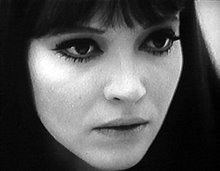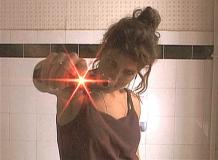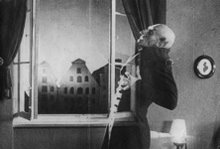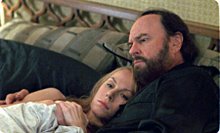



Above, some scenes from the film and director Almereyda on the set.
Michael Almereyda's Hamlet is the only film of a Shakespeare play that I like--that I think is not only good as an interpretation, but also good as a film. One reason for this is that this is a very self-reflexive piece of filmmaking. Besides being about the story of Hamlet, its also a film about the dominance of media, of visual culture, of communications technology in contemporary life. Almereyda manages to work in references to nearly every form of currently existing media. Video abounds; television screens and computer monitors, surveillance cameras and Times Square telescreens are included in nearly every shot. Some of the dialog is delivered via email, fax, teleprompter and answering machine; eavesdropping becomes wiretapping. And Hamlet wields a Pixelvision camera in the film's first extended sequence. As one critic remarked, "this is a Hamlet for the information age."
Almereyda has set his Hamlet in NYC year 2000 and slightly modified a few plot elements: Claudius is CEO of Denmark Corporation, fighting off a hostile corporate takeover by competitor Fortinbras. Elsinore is no longer a castle, but a swank hotel. Claudius and Gertrude make public appearances at press conferences and social benefits, not court.
Ophelia is a trust fund princess slumming on the LES, dressed in couture and sneakers and carting her cameras and photography equipment around in a Manhattan Portage messenger bag. Hamlet is a slacker film school student, a would be video artist obsessively reviewing footage of his life with the smudged door stamp from last night’s club still on the back of his hand. That we live in a world irrevocably mediated by the image is eloquently, wittily, and forcefully brought home by Almereyda's staging of that most iconic of all theatrical moments, Hamlet's "to be or not to be" soliloquy, in a Blockbuster video store.
The film also continually juxtaposes high and low culture elements on every level: the Shakespearian language we hear confronts the contemporary images we see, the soundtrack combines music referencing Hamlet by both classic composers (Tchaikovsky's "Hamlet") and rock musicians (Nick Cave and The Birthday Party's "Hamlet Pow, Pow, Pow"), even the casting carries this theme through by combining figures with pop culture resonance (Ethan Hawke, Julia Stiles and Bill Murray) with those more associated with theatre and Shakespeare (Sam Shepard, Diane Venora, Liev Schreiber).
The film is visually and aurally dense: there's much to look at and much to listen to. The score, by film composer Carter Burwell, is evocative and haunting. I uploaded it all to the Voxblog, Extra Things, if you want to listen to it.
So where can we most profitably place our eyes and ears?
While I think there is much to be said about how Almereyda treats Shakespeare's text, I don't know if that's the best place to begin for a class devoted to narrative. True, Almereyda cuts much, but frankly the last stage production I saw (Andrei Serban's referenced in my post below) ran about the same length of time. I like placing the famous speech from Act II at the beginning ("I have of late, where for I know not, lost all my mirth...") because it both cuts out the backstory blabla of the watchmen and it is my favorite bit in the play (though for me the best rendition of that speech in film remains Richard E. Grant's declamation in the final scene of Withnail & I).
Instead, I think we could begin with looking at the issue of mediation: the way our perception of the world, of how things are, is mediated by narrative and the various media in which it is encoded.
Above all, Almereyda's Hamlet argues for the primacy and power given film in contemporary society. That is why his film references so many forms of the reproduced image, and why he specifically locates the central elements of Shakespeare's play within an explicitly filmic context: Hamlet as aspiring filmmaker and avid film fan, the replacement of the play-within-a-play with a film-within-a-film, the Blockbuster location of "...to be or not to be...," and finally, Hamlet's questions about the reality of feelings emoted on the stage are now asked of a Movie Star, a pop culture icon of passion and action. "What would he do had he the motive and the cue for passion that I have?" asks this Hamlet, not of one of the court players, but of James Dean.
































5 comments:
Eternal sunshine of the spotless mind...
there's a film for you..
I will watch the movie, since you clearly love it.Wich is odd since i have no idea who you are.still,I will watch it.I suppose an advice is still an advice even though are worlds falling appart...
Oh dear...I didn't know "outsiders" could read these...
This is for a film class, Liz....glad you liked my post, but you caught it midstream...I'm not done with it yet!
Ah, I am back, both physically and mentally. Since it was vacation time (time for a break and to get away from long island) and mentally, (Was a bit sick over last 72 hours) once I returned, but, it's time to star blogging again. I figured I would start by reading the main class blog page to get back into the swing of things and comment on what I read here, then tomorrow, do my own blogging that will help me with the second paper that is due very soon.
I enjoyed reading the top blog on the Hamlet 2000 edition. I haven't read the old hamlet for over 10 years and really forgot almost all of it. The names of the characters sounded familiar and I cant wait to screen this film. I enjoy when you have an artist update a film or story with todays technology. Not too many films that I know of do this, but a few that come to mind would be the latest Rocky6 which brought the trilogy of the films to an updated status to reflect modern today with video games, cell phones, and the changes in Philly. Another film that comes to mind would be the godfather series with the last godfather movie showing modern day technology. In my opinion, GF3 was a remake of the same story line as the original God Father...just my opinion...i'm sure some will disagree.
I was also happy to learn something new about a word that you used in your blog, "Juxtaposes", which I didn't know exactly what it meant, so, once again, my learning was enriched outside the classroom because of this medium of learning. Gotta love Google and Websters online dictionary.
Off to read a bit more and get a few winks of sleep. I'll be posting again soon.
seeing these posts wets my appetite for tonights class, i can't wait to see the movie tonight. I haven't read much shakespeare, but so far this is probably my favorite tragedy. having the translation on the other side also helped me understand it better and enjoy it more! I feel that I need to re read it but without the translation to truly appreciate it, you know what i mean. The monolouge with the daggers and the conversation about where plonious lies [in regards to the worms] astounded me. i guess ill save more for my own blog, but i just wanted to express myself. LATAH
Post a Comment